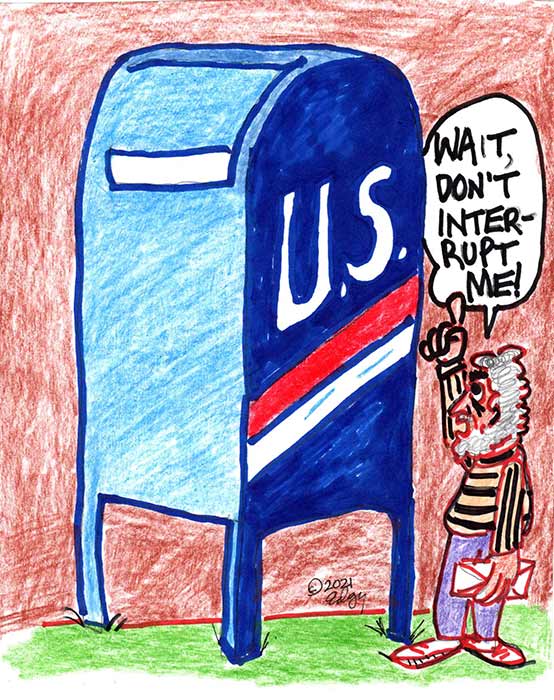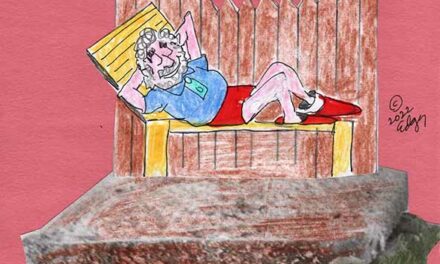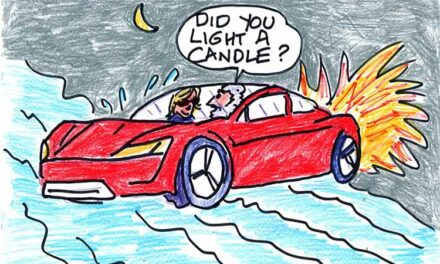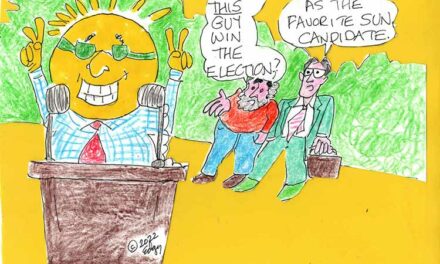Vote By Mail, Repent at Leisure
Why not going to the polls could be a good thing
By Ed Goldman
Starting in 2022, the great American tradition of trying to find your polling place—is it that Episcopalian church around the corner, the Henderson family’s garage a few blocks away or that elementary school named for British-born American cigar maker Samuel Gompers, whose impact on the nation’s history cannot be overstated?—will disappear in California, also known as The Initiative State.
All voting will now be done by mail, guaranteeing that statewide, regional and local election results will be available shortly after you’re reincarnated.
Polls Apart
I used to think I’d miss the experience of popping over to my neighborhood polling place on Election Day. But a single, fatal disease changed all that for me. No, not COVID-19. Donald Trump.
Before Trump’s reign of error, you could look forward to voting day because the chats you were likely to have with fellow voters waiting to fill out their ballots were far less likely to make your blood pressure achieve numbers akin to the national debt.
Now, I recognize that under California election law, Section 3018, we’re not allowed to “electioneer” at the polls. Since that’s a pretty silly word— reminiscent of Walt Disney’s “Imagineers” (the stupendously creative team he and his company assembled) and “Mouseketeers” (the stupifying team of kids he and his company assembled), here’s how the website usa.gov defines it:
“Electioneering means the visible display or audible dissemination of information that advocates for or against any candidate or measure on the ballot within 100 feet of a polling place, a vote center, an elections official’s office, or a satellite location.”
Not mentioned, natch, are the parking lot of that Episcopalian church, the curb outside the Henderson family’s garage or the tot-lot at the elementary school named for Samuel Gompers. Many a political discourse has been conducted on monkey bars and swings.
But the arguments, such as they were, simmered on “low.” They rarely achieved microwave-nuclear status. The only reported injuries involved middle-aged guys who, after venting their editorial spleens, thought they could still execute handstands on the monkey bars or 360-degree spins on playground swings.
To summarize, political palaver seemed a lot friendlier pre-Trump. So did politicians and voters. It was almost as if most of us felt that this was simply an election, not a call to arms, that if our candidate won, he or she did it fairly and squarely—and if he or she lost, a nefarious plot concocted by Godless baby eaters wasn’t to blame.
When I was a kid, I watched how my parents reacted, four years apart, to Adlai Stevenson’s losing the Presidential election to Dwight Eisenhower. They were disappointed but not scared that Ike was going to lead the country into a reboot of The Great Depression or World War III.
I felt the same way when Ronald Reagan beat the trousers off President Jimmy Carter and then, in the following election, former Vice President Walter Mondale, both of whom I’d voted for. While I was no fan of Reagan’s politics, I didn’t think he had an ounce of personal evil in his Tampico, Illinois bones. In fact, I still regard with some amazement that his administration remains one of the most corrupt in U.S. history (Trump subsequently took those top dishonors, with Warren G. Harding finishing a close second, according to members of the cottage-cheesy industry which studies this sort of thing).
I shouldn’t blame only Trump for this conversational climate change. Preceding his ascendancy to the allegedly highest office in the land, we had the phenomena of “Duck Dynasty,” an immensely popular cable-TV show that focused on family values and both genetic and learned stupidity. The emotional divide between liberals and conservatives, a fracture brought on by leaders and members of both parties, had widened exponentially, and rational dialogue apparently decided to decamp for other lands or galaxies. In some way, we became separate branches of the Frankenstein family, abetting in the creation of one of this century’s most cleverly opportunistic but startlingly dumb monsters.
This isn’t a viewpoint I could likely share 100 feet from my polling place, not to mention in most sports bars with a minimum of 12 plasma screens. It wouldn’t even go over well in a Democrat-heavy fern-Brie-and-wine bar, since the party of JFK is itself as splintered as my hands were when I thought refinishing a nautical dining-room table while not wearing gloves would be a snap.
But it turned out to be as misguided as the time I tried doing a handstand on the monkey bars.
Ed Goldman's column appears almost every Monday, Wednesday and Friday. A former daily columnist for the Sacramento Business Journal, as well as monthly columnist for Sacramento Magazine and Comstock’s Business Magazine, he’s the author of five books, two plays and one musical (so far).
Yes, Virginia
A Weekly Blog by Virginia Varela
President and CEO, Golden Pacific Bank
photo by Phoebe Verkouw
HACK ATTACKS (AND WHAT YOU CAN DO)
Last week, friends frantically notified me that my personal information was hacked. I felt violated, angry, and immediately started the time-consuming process of correcting the situation.
Here’s a plan and tips I’d like to pass on in case it happens to you, mostly coming from trustworthy Federal Trade Commission publications:
1. Remain calm and work out a plan or get some trustworthy person to help you.
2. Visit IdentityTheft.gov/breach for detailed advice about your particular situation.
3. If your Bank Account, Credit or Debit Card was exposed to fraud:
• Contact your bank to close the account and open a new one. This is an example of a time where a good relationship with a trustworthy bank advisor will come in handy.
• Contact your bank or credit card company to cancel your card and request a new one.
4. If your online login or password is exposed to fraud:
• Log in to that account and change your password. If possible, also change your username. If you can’t log in, contact the company. Ask how you can recover or shut down the account.
• If you use the same password anywhere else, change that, too.
• If it’s a financial site or if it’s a location where your credit card number is stored, check your account for any charges that you don’t recognize.
5. When your Social Security Number is exposed to fraud:
• If you are offered free credit monitoring, take advantage of it.
• Get your free credit reports from annualcreditreport.com. Check for any accounts or charges you don’t recognize.
• Consider placing a credit freeze. This makes it harder for someone to open a new account in your name. If you decide not to place a credit freeze, at least consider placing a fraud alert.
• Try to file your taxes early—before a scammer can. Tax identity theft happens when someone uses your SSN# to get a tax refund or a job.
Sooner or later, most of us get “hacked.” The key is to not be a victim. Be a take-action hero!
sponsored content














